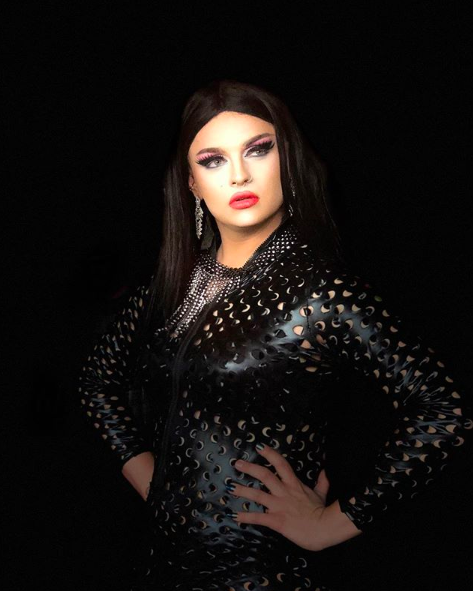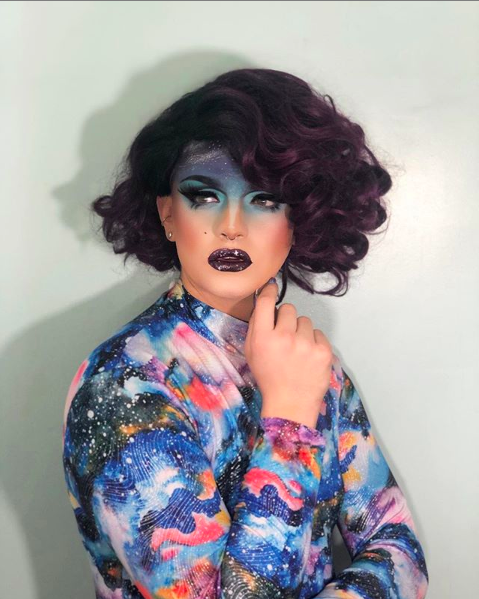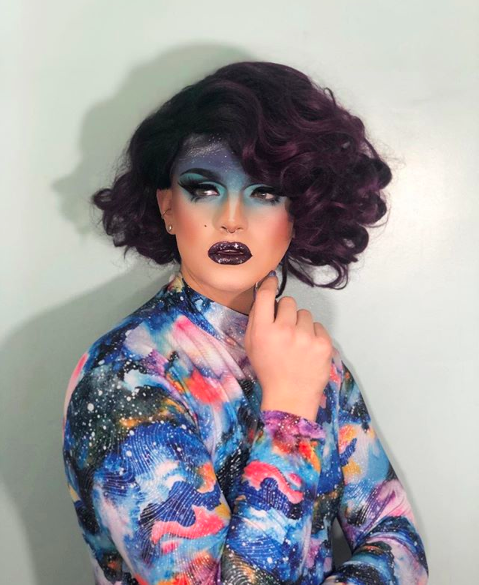Evan Schacherer always found the most acceptance in their high school marching band. Now they feel that comfort while performing drag as Holly Berry Blossom.
Lights flare to life, casting a glow on Evan Schacherer, who is known as Holly Berry Blossom on stage. They wear a jumpsuit, vibrant blue heels, and a wig. Lady Gaga’s “Gypsy” blares over the speakers, and the crowd roars for Spectrum’s Nightmare Before Drag Show event in the fall of 2016.
The heels hurt, and the clothes are not the top-notch quality Evan would prefer. But the wide smiles in the audience make the hours spent rehearsing and doing makeup worth it.
Evan grew up in a small town in Ohio where they were surrounded by supportive female role models who allowed Evan to express more feminine behaviors. Evan says their family and friends didn’t impose a lot of the gender norms often placed on young boys, and Evan enjoyed playing dolls and dress up. They lived in Ohio until moving to Indiana when Evan was in first grade.
By middle school, things weren’t as easy as they’d been in Evan’s younger years. Evan stood out from the “normal guys” when they cried, wore feminine clothes, and showed a lack of interest in girls.
So, they tried to fit in. Evan started hanging out with other guys and dressing more like them. But they hated every moment.
According to the 2018 American Psychological Association’s Guidelines for Psychological Practice with Boys and Men, when boys feel obligated to act in traditionally masculine ways, which can include suppressing feelings or expressions, emotional health can be harmed.
Still, Evan tried to conform, tried to escape the discomfort of being different. But they knew the attempts to fit in must not have worked when other students asked if Evan was gay.
Evan hated not knowing who they were. They hated not fitting in. As a result, they developed mental health issues, including problems with self-esteem and internalized homophobia.
Sabra L. Katz-Wise, an assistant professor in pediatrics at Harvard Medical School, research associate in adolescent/young adult medicine at Boston Children’s Hospital, and instructor in Social and Behavioral Sciences at Harvard T. H. Chan School of Public Health, describes internalized homophobia as “feelings of hatred or disgust that some people feel about their sexual orientation based on [the] external stigma of lesbian, gay, and bisexual people.”
According to Revel and Riot, an LGBTQ-run nonprofit organization, some effects of internalized homophobia include denial, judgement of other homosexual individuals, problems with coming out, or an inability to experience physical or emotional intimacy with others. LGBTQ individuals are nearly three times more likely to experience mental health conditions such as major depression or generalized anxiety, according to the National Alliance of Mental Illness.
Before coming to college, there was one group that never let Evan down: band. Evan first became involved with musical arts in fifth grade and adored performing. In high school, Evan continued to find comfort within the marching band, where their classmates supported who they were. This gave Evan more confidence in their identity, and they started scouring Tumblr and other websites to gain a better understanding of their sexuality. They discovered new ideas and connected words to experiences, eventually embracing that they were gay.
Evan started by coming out to their parents, but not quite on purpose.
Their mother had found the search history on Evan’s computer, and she caught Evan one morning when they returned home.
We need to talk on the porch, she said.
Evan knew immediately what the discussion would be about, but the conversation was still long and difficult. For the most part, Evan’s parents accepted Evan’s sexuality, even if it took some time to understand.
Evan slowly began coming out to friends and bandmates, finally having the chance to “enjoy their own skin.” They joined the color guard team, entered leadership positions, and learned to be more open with others.
But after high school, Evan searched for a new place to belong.
Three years ago, they sat among thousands of other freshmen of the Ball State class of 2016. While there, they had their first encounter with Spectrum.
They learned of the LGBTQ community presence on campus and tucked away the information in their mind. After some investigation on Ball State’s website and a visit to Spectrum’s booth at the Ball State activity fair, Evan attended their first Spectrum meeting. They listened, intrigued but quiet as others told their stories, their fears, their uncertainties. They found themselves connecting with the people around them.
They quickly found themself embraced by the members, a new family who loved them for every aspect of their being. Making quick friends, especially with the executive committee, Evan became engulfed into the LGBTQ community on Ball State’s campus. They frequently attended parties with other Spectrum members. They played games, watched movies, listened to music, and enjoyed comfortable conversations.
Eventually, Evan fell in love with the gender-playing aspect of drag. Evan had never felt that they belonged to a solid gender, so seeing the extremes in drag fascinated them.
However, Evan’s love of drag shows have roused a different issue, especially with their father. In the beginning stages of their drag career, Evan was still not quite sure what they were doing, and their father’s negative reactions to the idea of drag made Evan even more self-conscious.
You’re not doing the drag show tomorrow, their dad said during one phone call. I’m not letting you.
Okay, Evan mumbled over the phone, heartbroken.
I’m just worried about you getting a job, their father added. This could impact that.
Although Evan’s father explained the reasons behind his disapproval, Evan was still hurt. They spent time with close friends, waking up the next day with a positive outlook. They would still stride confidently onto the stage, they decided, finishing their performance with a smile.
Evan says if a workplace wouldn’t accept their involvement with drag, they wouldn’t want to work for that company anyway.
Evan’s mother and sister, on the other hand, wholeheartedly support Evan’s performances. They all practice makeup and talk about hair, the lights, the stage, the costumes, and the music. Evan hopes their family will attend a show one day.
Holly Berry Blossom, Evan’s drag queen persona, brings them a lot of joy, but their wallet a lot of pain. Being Holly is costly. However, Evan says she is a magnificent role model for the community and allows Evan to continue their love of art and entertainment. Holly has a large following on social media, especially on Instagram, where followers show support and offer feedback on the various looks Holly experiments with.
 Dressed in full drag attire, Evan and other drag queens advertised the drag show at the Scramble Light on campus this spring.
Dressed in full drag attire, Evan and other drag queens advertised the drag show at the Scramble Light on campus this spring.
I love your wig, one passerby said.
Oh, you look great! another person added, smiling brightly as they pass, taking a handout with details about the show.
Evan knows there are negative comments, but they don’t let the stares dull their shine. They want to make people talk, make them uncomfortable, and make them question their ideas—this is what Evan loves about drag.
Currently, Evan acts as Vice President of Spectrum. Together with their committee, they planned the spring semester drag show that took place on April 6.
“There are so many little things that go into making a great show,” Evan says, “All our hard work pays off because we get to see our community flourish and glow a little bit brighter.”




